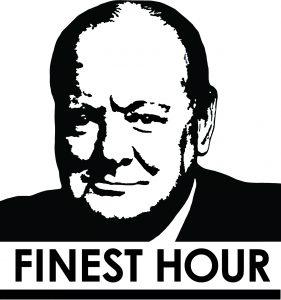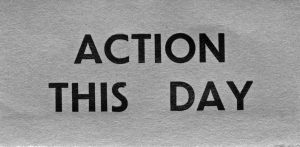
Finest Hour 184
The Accession

Winston Churchill, Parliament Square, London © Sue Lowry & Magellan PR
July 29, 2019
Finest Hour 184, Second Quarter 2019
Page 15
By Winston S. Churchill
Extract from article that first appeared in the Evening Standard of 2 May 1935 to mark the twenty-fifth anniversary of the death of Edward VII and the accession of King George V.
King Edward VII died in harness. On the fourth of May, 1910, it was my duty as Home Secretary to homage a Bishop. The King performed this ceremony in a very small sitting-room leading out of his bedroom.
Assisted by the Bishop of Winchester, I brought the Bishop designate into the Presence. King Edward was sitting in his chair immaculately dressed in a frock coat. His waistcoat had the white revers round the collar which was then fashionable. It was known he was ailing. I thought he looked frail and had the impression he was short of breath, but otherwise he betrayed no sign of illness or weakness.
The Bishop raised his hands as if in prayer. The King took them between his own. I administered the oath by which inter alia the new Bishop accepts the Royal supremacy not only in temporal but also in spiritual matters. The function concluded, the King rose, smiled graciously, and we bowed ourselves out of the room.

2024 International Churchill Conference
In forty-eight hours he was dead. For nearly thirty hours after this ceremony he continued to sign papers and discharge his duties. Thus he went on quite calmly till he dropped, and met death unperturbed as it came.
In him we lost a good and attractive King who had a warm heart and much worldly wisdom, and who understood his constitutional duties thoroughly, while nevertheless exerting a great deal of personal influence upon public and social affairs.
He was greatly loved for himself by a host of friends who mourned him with unaffected sorrow. There was a sparkling quality about him which even if he had not been a Sovereign would have made him very welcome in any company, rich or poor. His personal charm, his human qualities, his keen interest in Society and in the lives of those about him, his delight in the companionship of women, all contributed to the genial impression he created. He moved in an atmosphere of gaiety and kindness.
He was sixty when he ascended the throne, and his prime was spent under the august shadow of Queen Victoria. Thus he was more a man of the world than a man of affairs, and his strongest views were developed upon the smaller points of life and policy.
But he had a very clear idea that Germany was going to be a great danger to his realm, and that we must at all costs have an overwhelming Navy. He had a great liking for the French and an intense personal antipathy for the Kaiser.
In domestic politics he naturally adopted Conservative views, but he was always loyal to his Ministers, irrespective of party. He would often in conversation with Ministers make some mordant and long-thought-out remark; but he would never carry a discussion any further than the first interchange. When response was made, he disengaged himself promptly but with the greatest ease.
Although he had a perfectly recognizable foreign accent his whole nature and outlook were characteristic of the English. He enjoyed every day of his life, and made others enjoy it too. His personal kindness to small people and consideration for their feelings were extraordinary. He was all that we mean by “a great gentleman.”
On the night of 6 May anxious crowds gathered about the railings at Buckingham Palace waiting for the bulletin, and when finally at 11:45 o’clock his death was announced grief was manifested visibly by all sorts and conditions.
The demise of the Crown entails prompt and swift action and ritual. The Privy Council met the new King in the throne room of St. James’s Palace the next day at noon. We were perhaps one hundred persons.
The new Sovereign entered, supported by the Archbishop of Canterbury and some other high dignitaries, and was immediately recognized as King George V, and acclaimed as the lawful ruler of the British Empire.
He spoke a few simple sentences about his loss, about his new responsibilities and his resolve to discharge them with God’s help in all fidelity. He then withdrew, and we all went out on to the leads where the heralds in their sparkling, spangled attire proclaimed the accession. The trumpets sounded, the guards presented arms and solid masses of people packing the narrow space cheered and waved their hats. The new reign had begun.
Subscribe
WANT MORE?
Get the Churchill Bulletin delivered to your inbox once a month.



